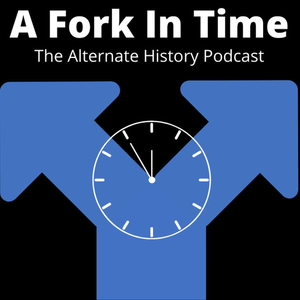
Thomas Sankara - The African Che Guevara
01/11/16 • 47 min
Previous Episode

Emily Morgan - "Yellow Rose of Texas"
There are three (3) historical documents that support the existence of an Emily Morgan in connection with the time period immediately surrounding the independence of Texas. Emily ended up catching the eye of Mexican General Santa Anna, and against her will was forced to her tent and kept there for his amusement and entertainment. The legend goes, Santa Anna was so enthralled with Emily’s beauty that he was literally caught with his pants down when Sam Houston and troops rode into the fields of San Jacinto and decimated the Mexican army in one fell swoop; also capturing Santa Anna while he tried to escape. But, the story of the legendary Emily Morgan doesn’t end there, legend goes that Emily Morgan may have intentionally stayed behind in New Washington, and then became a prisoner of Santa Anna all in an effort to distract him and potentially act as a spy to learn his plans and potential troop movements. Whatever the case, Santa Anna was forced to attempt his escape in only a linen shirt and silk drawers. The only written account of this was captured by a visiting Englishman named William Bollaert, who captured the following in a diary entry from 1842 after being told the story by Sam Houston : “The Battle of San Jacinto was probably lost to the Mexicans, owing to the influence of a Mulatto girl, Emily, belonging to Colonel Morgan, who was closeted in the tent with General Santa Anna, at the time the cry was made ‘the enemy! They come! They come!’ and detained Santa Anna so long, that order could not be restored readily again.” The Texas State Library actually has documentation to even further reinforce the story and the myth. In 1837, “Emily D. West” applied to the Secretary of State for the Republic of Texas for a passport to return home, stating in fact that she had lost her “free papers” at San Jacinto in April 1836. The document with the Texas State Library further states that the Emily applying for the passport came to Texas from New York in 1835 with James Morgan, and further confirms that she was in fact a woman of color, but not a slave. The lyrics of the original song said the following: There’s a yellow rose in Texas, that I am going to see; No other darky knows her, no darky only me; She cried so when I left her, it like to broke my heart; And if I ever find her, we nevermore will part. She’s the sweetest rose of color this darky every knew; Her eyes are bright as diamonds, they sparkle like the dew; You may talk about your Dearest May, and sing of Rosa Lee, But the Yellow Rose of Texas beats the belles of Tennessee; When the Rio Grande is flowing, the starry skies are bright; She walks along the river in the quiet summer night; She thinks if I remember, when we parted long ago; I promised to come back again, and not to leave her so; Oh now I’m going to find her, for my heart is full of woe; And we’ll sing the songs together, that we sung so long ago; We’ll play the banjo gaily, and we’ll sing the songs of yore; And the Yellow Rose of Texas shall be mine forevermore. The immortalization of a black woman in song, especially one sung on the battle lines, and otherwise racially divided segments of white Texans comprises an unprecedented circumstance matched only by a second fascination that’s a quieter kept secret, but plays to the importance and impact of the diaspora. A love story between black people that was powerful enough to be immortalized in song. The woman and the song serve Texas history well, but they serve African American history, folklore and culture even better.
Next Episode

Kathleen Cleaver - A Living Liberator
Kathleen Neal was born on May 13, 1945 in Memphis, Texas. With two parents who were college graduates, it wouldn’t be tough to see the important role that education and higher learning would go to play in her life; and also the intellect that she would go on to display in her activism work. Her father joined the Foreign Service and the family would spend the next several years in India, Liberia, Sierra Leone and the Philippines. These experiences abroad in countries populated mainly by people of color, especially such diverse ethnic groups would forever shape her demeanor and outlook. In the early 60’s, Kathleen Neal returned to the United States to go to high school. Initially she enrolled at Oberlin College in Ohio, and then transferred to Barnard College in New York City. In 1966, Neal’s heavier interest in activism saw her drop out of Barnard and concentrate her involvement in the Student Nonviolent Coordinating Committee. One of her first tasks was to organize a black student conference to take place at Fisk University in Nashville, Tennessee. At this conference is where she would meet the then Minister of Information for the Black Panther Party for Self-Defense, Eldridge Cleaver. Kathleen would go on to say her and Eldridge were a “meeting of the spirit, she was becoming a revolutionary and was very impressed with his statesmenlike quality.” carrying the name Kathleen Cleaver, she decided to leave SNCC and join her husband in San Francisco to work for the Black Panther Party. Cleaver would become the first woman included in the Party’s central committee. Engaged as the Communications Secretary, Cleaver’s role was to write and give speeches nationwide, and also be the media spokesperson for the organization. Kathleen returned to college receiving a full scholarship to Yale University in New Haven, CT where she would enroll in August 1981. She would graduate in 1983, summa cum laude and Phi Beta Kappa with a Bachelor of Arts in History. In 1987, Kathleen Cleaver divorced Eldridge, while in law school. She would graduate from Yale Law School in 1988; joining the New York City law firm of Cravath, Swaine and Moore shortly thereafter before accepting a position as a law clerk for the United States Third Circuit Court of Appeals in Philadelphia in 1991. Then in 1992, Cleaver joined the faculty of Emory University in Atlanta, Georgia where she teaches the law.
If you like this episode you’ll love
Episode Comments
Generate a badge
Get a badge for your website that links back to this episode
<a href="https://goodpods.com/podcasts/black-history-podcast-5958/thomas-sankara-the-african-che-guevara-214673"> <img src="https://storage.googleapis.com/goodpods-images-bucket/badges/generic-badge-1.svg" alt="listen to thomas sankara - the african che guevara on goodpods" style="width: 225px" /> </a>
Copy




